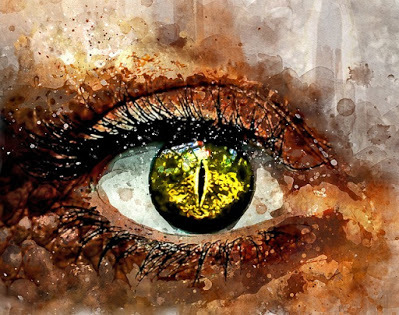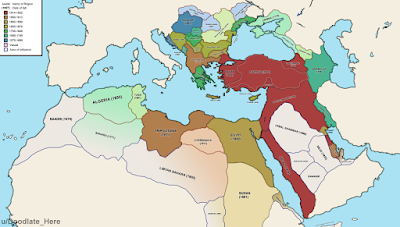Stephen Roney's Blog, page 201
April 17, 2021
The Reptile Brain

“Anything possible of being believed is an image of truth”—William Blake.
David Icke believes the world has been ruled by reptilian aliens for thousands of years.
Icke’s claims seem automatically disproven by the fact that he is able to publish his claims and speak them publicly. If there were such a conspiracy of space lizards, they would have silenced him. Jeffrey Epstein did not kill himself.
But they have to be an image of truth, because so many find them compelling.
What does “reptilian” really mean here?
The most striking thing about reptiles is that they lack concern for their young. They lay their eggs, and wander off. This seems to correspond to the fact that their brains lack the parts that, in the human brain, correspond to our emotions.
“Deep inside the skull of every one of us there is something like a brain of a crocodile. Surrounding the R-complex is the limbic system or mammalian brain, which evolved tens of millions of years ago in ancestors who were mammal but not yet primates. It is a major source of our moods and emotions, of our concern and care for the young. And finally, on the outside, living in uneasy truce with the more primitive brains beneath, is the cerebral cortex; civilization is a product of the cerebral cortex.”
— Carl Sagan, Cosmos
In other words, reptiles seem to operate only on immediate urges. They may be self-aware, but they are not aware of any other “selves” in their universe. Just things they want or do not want. This is the “reptile brain.”
Icke’s vision of reptilian humans rings true because there really are such reptilians: beings in human shape who nevertheless operate only on urges, unaware of any other “selves” in the universe. These are the people we call “narcissists.” The “type B personality disorders,” in psych speak.
Icke seems to understand this. I have not read any of his books, but I see he speaks of love as the antidote to the dominion of the lizards.
And they do by and large rule the world. When you care for no one but yourself, and recognize no morality, you have a huge tactical advantage. Of course such people will regularly end up on top. Anyone in power should at least be suspected, as Icke does, of being a lizard.
Icke claims that society as we know it is largely designed by these reptilians to generate fear and anxiety. He says this energy is nourishing to the lizard overlords.
This too makes metaphoric sense. The narcissist has an insatiable need to show their superiority, by causing others to cower.
“There will be no curiosity, no enjoyment of the process of life. All competing pleasures will be destroyed. But always— do not forget this, Winston— always there will be the intoxication of power, constantly increasing and constantly growing subtler. Always, at every moment, there will be the thrill of victory, the sensation of trampling on an enemy who is helpless.
If you want a picture of the future, imagine a boot stamping on a human face— forever. ”
--George Orwell, 1984
The urge to exert power over others, and have them feel it, explains much of human life and human history.
Not to mention the dysfunctional dynamics of many families.
'Od's Blog: Catholic comments on the passing parade.
April 14, 2021
A Justification for Empire
 Dissolution of the Ottoman Empire
Dissolution of the Ottoman Empire
A correspondent observes that “history illustrates that racism is declining, but ever so slowly.”
I’m not so sure. That is the “Whig view of history” we are traditionally served: that the progress of history is always towards our own political preferences. Accordingly, we declare ourselves on “the right side of history,” and justify our views with “this is 2021, after all.”
Which may be so, in broad terms. Given that there is a God, it makes sense that the greater trajectory of history should arc towards justice. However, recently I have come to doubt this particular premise: that racism specifically is in decline. It seems to me that racism has grown frighteningly worse over the past few years. That in turn makes me look back and question. What are the real dynamics here?
When you think of it, racism was almost necessarily worse in the past few centuries than it was earlier. The very concept of “races” of humans is a modern scientific one. We can pretty much trace it to Darwin. Before Darwin, ancestry might have mattered, breeding might have mattered, but not race. Hitler and the Nazis certainly traced their racial theories to him.
The modern idea of the nation state emerges from the same source. It was born in the 1860s, in the wake of Darwin, and reached the status of international law by 1917, with Wilson’s 14 points. "National aspirations must be respected; people may now be dominated and governed only by their own consent. 'Self determination' is not a mere phrase; it is an imperative principle of action.” Wilson believed firmly in race and in racial segregation at home; it was a “progressive” idea. National borders were to be established on the basis of race; races were in principle not to mix.
Before the nation state, we generally had little such notion; which is why empires seemed reasonable ways to run things. And they did produce general peace among racial groups. With nation states, interracial war broke out.
In an empire, civil allegiance was not to one’s race, but to a royal family or to a set of shared ideals. Anyone could become a Roman citizen, for example, based on merit. The Holy Roman Empire or the Ottoman Empire were based on shared religious principles, not race.
Racism may now be growing, not declining, because we are losing our shared ideals. Religion was replaced for a time by secular humanism, but this has not proved durable. Postmodernism has rejected the very possibility of shared ideals. What is left is self-interest and instinct, which throws us into tribalism. For humans are instinctively tribal animals. Only civilization ever kept us from each other’s throats.
I am not advocating a return to Empire. But until corrupted by Darwinism in the nineteenth century, the problem with empires was not racism, but the lack of democracy. That might even have been simply necessary at the time, based on distance, not race. The British, after all, did not extend the Imperial franchise to the Thirteen Colonies, Canada or Australia. Instead, as soon as responsible government was introduced, these regions became independent. It was apparently not practical for them to send representatives to serve in Westminster.
Are we doomed to an inevitable spiral downward into savagery? I imagine not, on the grounds that there is a God, and the arc of history generally really does bend towards justice.
'Od's Blog: Catholic comments on the passing parade.
April 13, 2021
Laughing out of Both Sides of the 49th Parallel
I have been “binge watching” the Canadian sitcom “Corner Gas” in a moderate way: one episode each evening. At the same time, for some reason, episodes of the old American sitcom “WKRP in Cincinnati” have been popping up in my YouTube feed. I remember it as pretty good, so I’ve watched a few of those recently as well.
I think comparing the two illustrates the difference between American and Canadian humour.
WKRP, American, has a mix of sympathetic and unsympathetic characters. Some are there to be laughed at, but disliked, and some are straight, unfunny, and likeable. Herb and Les are unlikeable clowns. Andy or Bailey or Venus Flytrap never put a foot wrong.
In Corner Gas, all the characters are sometimes sympathetic, sometimes unsympathetic. All have flaws and sometimes look foolish; all are fundamentally likeable. Even Oscar, who comes closest to being a villain. He is too much like a bratty child to dislike. Nobody is above getting ribbed, including the show itself, which often breaks the “fourth wall.”
This is consistent in Canadian humour. There are no heroes or villains in Leacock’s Sunshine Sketches either.
I think it is an expression of a religious difference between Canada and the USA. The USA was founded largely on Calvinist principles: the Reformed tradition of the Puritans in the north, the Baptists in the South, the Dutch Reformed in the Mid-Atlantic. Calvinists see people as either damned or elect; all good or all evil.
Canada was founded largely by Catholics, Anglicans, and Methodists. Catholics, Anglicans, and Methodists believe that all of us are sinners, but that all of us are capable of redemption at any moment.
And that pretty much accounts for the difference between the American and Canadian character overall.
'Od's Blog: Catholic comments on the passing parade.
April 12, 2021
Myths We Live By
The common cultural myth, inherited from the romantics but not original to them, is that civilization is bad and man is naturally good. This is a consoling way to look at the world; it means by doing just whatever we want, we are also doing the good. But obviously wrong. If man is innately good, how could he have created a civilization that is innately bad? Where could evil, moral evil, have come from?
It ends up scapegoating the Jews, or rich capitalists. It ends up assuming that, while we are born good, some others are born irredeemably bad alien beings.
A correspondent recently cites the song “You’ve Got to Be Carefully Taught” as proof that racism is learned behavior. Broadway tunes are not good scientific sources. Nor are fantasies of some Garden of Eden in the South Pacific. Humans, like the other higher primates, and like dogs or sheep, are herd animals. Fear of the other is hard-wired by evolutionary pressures. Everyone is prejudiced who does not make an effort not to be. Fortunately, we are not animals, and can rise above our programming.
This naïve romanticism is, I suspect, also behind so many assertions that the solution to racism or sexism or “rape culture” is to educate people that “abuse of others is unacceptable.”
Yes, ethics needs to be taught. But knowing something is right does not compel anyone to do it. Morality is a struggle against instinct and self-interest. You cannot eliminate murder and theft by simply telling people murder and theft are wrong. If it were so, there would be no such thing as ethics.
'Od's Blog: Catholic comments on the passing parade.
April 11, 2021
Pippa Passes

The death of Prince Philip, I expect, will kill any public sympathy for Megan Markle or Prince Harry.
It is reminiscent of the death of Princess Diana. I strongly suspected that she was the problem in that marriage, that she was being selfish and irresponsible. But her death evoked sympathy; the royal family had to come onside and celebrate her or look heartless. Charles’s reputation has never recovered.
Now it works the other way. Harry and Megan look pretty callous for stirring up scandal for the royal family while Prince Philip was, we now discover, terminally ill.
The royal family may forgive them. The public never will.
The Duke, who devoted his life to service of the monarchy, may have given his greatest service with his death.
'Od's Blog: Catholic comments on the passing parade.
April 10, 2021
Damnation by Faith Alone
We shall not cease from exploration
And the end of all our exploring
Will be to arrive where we started
And know the place for the first time.
Through the unknown, remembered gate
When the last of earth left to discover
Is that which was the beginning;
At the source of the longest river
The voice of the hidden waterfall
And the children in the apple-tree
Not known, because not looked for
But heard, half-heard, in the stillness
Between two waves of the sea.
Bishop Sheen once said “There are not one hundred people in the United States who hate The Catholic Church, but there are millions who hate what they wrongly perceive the Catholic Church to be.”
That includes many people raised Catholic.
Part of this is anti-Catholic propaganda; part of this is confusing Catholicism with other denominations; much of this is pure culpable ignorance.
In early adolescence, I thought I was an atheist. That did not last; but it took me many years of intense searching to claw my way back to where I needed to begin.
Hoping to save others much wasted time and suffering, I want to look at one common fallacy, a very grave one, one that troubled me.
It is the faith thing.
People think faith means believing things without evidence. I remember at one point explaining that I could not accept Western religion because it demanded a “leap of faith.”
 The postmodern leap of faith.
The postmodern leap of faith.
This comes at least in part from Luther, who believed in “salvation by faith alone.”
News flash: Luther was not Catholic.
Faith is important in Catholicism, but it does not mean choosing to believe something. That is postmodernism, and that is Satanic. Let me make that clear: that is Satanic. A moral person must seek the objective truth, wherever that may lead.
“Faith,” dating in English from the 14th century, means primarily “The fulfilment of a trust or promise, and related senses.” (OED). As in “keep faith,” or “keep the faith”: to be loyal to one’s commitments. This is pretty much its Catholic sense as well: to stay the course. To go to mass, to keep the commandments, to run the race, to fight the good fight. It has nothing to do with deciding to believe or not believe in the existence of God; it was clear enough to me by the age of 18 that this was a smokescreen question, an avoidance of the issue. The existence of God is not in doubt. It is demonstrable.
“Our holy mother, the Church, holds and teaches that God, the first principle and last end of all things, can be known with certainty from the created world by the natural light of human reason.”
- Vatican Council I, Dei Filius 2: DS 3004.
There are dozens, if not hundreds, of convincing proofs of the existence of God. Only a fool could say in his heart “there is no God.” The Bible takes no trouble to make the case: it is self-evident.
There is a second meaning of “faith,” in the religious context. OED: “the capacity to spiritually apprehend divine truths, or realities beyond the limits of perception or of logical proof.” While the existence of God is apparent to reason, his nature is self-evidently beyond our comprehension. In places where reason cannot be employed, faith must be resorted to: we must take things we cannot understand “on faith.” These are the things the Church calls “sacred mysteries”: the Trinity, the Incarnation, the Resurrection.
Conversely, anyone who takes anything “on faith” that he cannot think through for himself, or simply chooses to believe something despite contrary evidence, is guilty of the deadly sin of acedia. This is one of the Seven Sins that lead to sure damnation.
'Od's Blog: Catholic comments on the passing parade.
April 6, 2021
Unethical Materials

A proposed checklist to evaluate multimedia content for use in schools just came across my desk. One of the criteria was “ethical elements.”
Digging deeper, this means the presence of “discrimination, bias, violence, and sexually suggestive material.” Materials used in classrooms at any level must not include these. And, to clarify further, “discrimination” means “discrimination related to gender, age, race, religion, and culture.” “Bias” means “bias for a particular notion and theory.”
This seems unworkable.
To begin with, we are talking about words and images, not actions. Based on the principle that my right to swing my fist ends where your nose begins, it is difficult to conceptualize discrimination in this context. Presumably, what we do not want is material advocating discrimination on these grounds. But that is not what the guidelines say: they use the vague term “related to.” The term used in most human rights legislation is “based on”: that one must not discriminate against persons “based on X.” “Related to” suggests one must instead not discriminate between religions or cultures or ages or genders. One must not distinguish between British and French cuisine, and one must certainly not say one is better.
This is absurd, and leads to unfortunate dining experiences. And human suffering.
The definition of “bias” seems objective and reasonable—but note that it would mean no teaching the dangers of global warming without featuring the other side of that debate; and no teaching the Theory of Evolution without also citing Creationism and Intelligent Design. And that’s just the start. Some people do insist that there was no Holocaust—so you cannot privilege the view of history that says there was. Some say there was no moon landing, there are alien lizards among us, and the earth is flat. Again, no bias allowed.
Prohibiting materials featuring “violence” would prohibit discussion of the news, and most of world history. Not to mention most fiction, in any medium, and any fairy tales. Who benefits from that? Certainly not anybody seeking an education.
Prohibiting sexually suggestive materials might make sense for teaching children, but a blanket prohibition means you cannot teach the Bible, the Krishna legend, or most great literature.
The problem here is that, in the name of inclusivity, we have jettisoned all specific moral traditions. Were we able to refer to the Ten Commandments, or the Analects, or the Dhammapada, or Sharia, weeding out unethical material would be relatively straightforward. While there are universal principles of morality, the average person cannot do very well at working them out in every instance on the fly. We’d probably require a graduate seminar for each individual decision. Without this, absurdities are inevitable.
We settle on “violence” or “sex” as proxies for “immorality,” for example, because they are objective and indisputable; not because they are unethical. Ideas like “discrimination” and “equality” turn out to be too abstract for most to understand.
We need to get back to our traditional moral standards. Of the great moral traditions, it matters far less which one we follow than that we can all agree on applying one or the other--at least within a given educational institution.
'Od's Blog: Catholic comments on the passing parade.
April 5, 2021
A Shot in the Arm

Got the Pfizer vaccine, first dose, yesterday—Easter Sunday.
No detectable side effect so far. Not even an aching arm.
I figure in three weeks, round about April 25, I will have substantial immunity, and need not worry about being out and about. Masking and distancing still, but only for the sake of others’ peace of mind.
Surprised to learn now that my cousins, all but one of whom are younger than I, have all already had their second dose of Pfizer. How can that be? I’ve been keeping close tabs, and got mine as soon as I was eligible.
I think it must be because they have their Indian cards. Racial preferences; or, put more frankly, racial discrimination. My own second shot, although older and with a couple of comorbidities, is not slated until the end of July.
It might make sense to rush-vaccinate people living on reserves, based on higher infection rates. Online, I see claims that infection rates on reserves are 187% of the national average. On the other hand, the fatality rate is much lower—less than half. As a matter of fact, as of August, the story was that the rate of COVID, too, was much lower on reserves than in the general population: only 25% of the national average.
Whatever is happening currently on reserves, shouldn’t the risk be greater in urban settings, where people are closer together? Are matters worse on reserves than in other poor communities, or is the issue just poverty? In any case, my cousins are prosperous and indistinguishable from their urban neighbours. The different treatment seems based not on any scientific or humanitarian justification, but purely racial preference.
We are creating different classes of citizenship in Canada based on race.
April 4, 2021
Gunter: O'Toole Is a Dud
April 3, 2021
He or She?
 Filipino transvestite beauty queen.
Filipino transvestite beauty queen.Jordan Peterson rose to prominence over which pronouns to use to refer to transvestites. This has become a dominating issue: if someone looks like a woman, but is in fact biologically male, do we say “he” or “she.” Or “zhe,” or “they.” Or seventy or a hundred other possibilities now being floated.
This is a relatively new problem in North America, but it occurs to me it is not elsewhere. In Thailand or the Philippines, transvestitism has been open and socially accepted for generations, perhaps centuries. So I thought to ask my Filipina wife, in Visayan, do you refer to a male-to-female transvestite as “he” or “she.”
She reports that, as indeed seems most sensible, biological sex is definitive. He may look like a woman, but he is still, in fact, “he.”
Problem solved.
'Od's Blog: Catholic comments on the passing parade.



